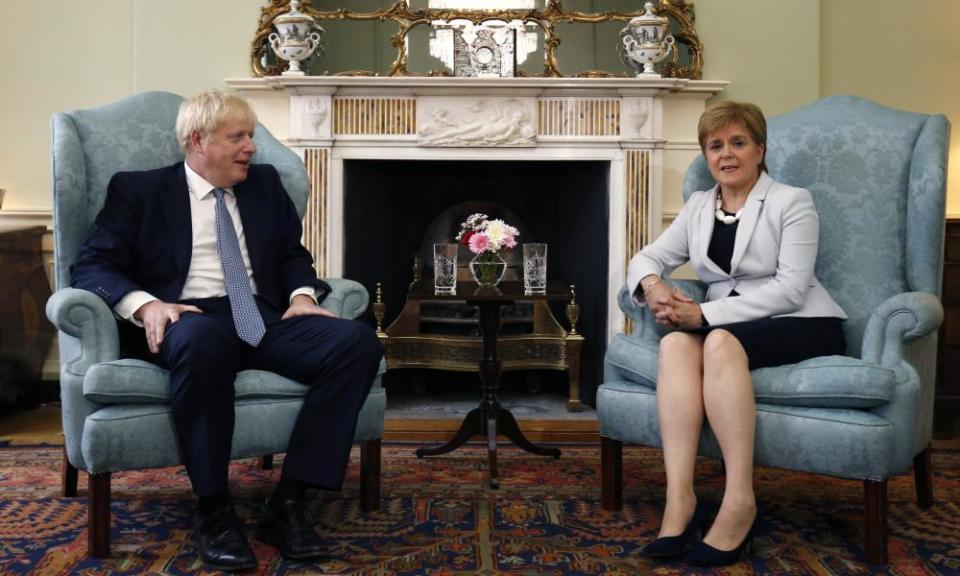Scottish independence isn't going away. Will the Tories be its curators – or victims?

Passionate unionist Boris Johnson must be thanking his lucky stars for the spat between the SNP leader, Nicola Sturgeon, and her predecessor, Alex Salmond. There was a sudden dip to 50-50 this week in poll support for Scottish independence.
But I doubt if it will last. Whatever happens in the coming May elections to the Scottish parliament, the issue of independence is not going away. Once the idea takes hold of a nation’s political soul it is never satisfied until, in some sense, it is achieved. That has been the lesson elsewhere in Europe, of Ireland, of the former nations of Yugoslavia and Czechoslovakia. Britain’s quarter-hearted devolution in 2000 has not worked, because London could not be trusted to keep its sticky hands off the levers of central power. This week alone Rishi Sunak, the chancellor, took control of all post-pandemic subsidies, deciding who gets what aid and which industries are financed. Unpopular lockdown was devolved to Edinburgh, nice recovery is centralised to London.
Related: Nicola Sturgeon accuses opposition of prejudging outcome of inquiries
Johnson cannot deny the Scots the form of government they want, and the more he stands in its way the more they will want it. No hoary Churchillian imperial gene will stop them. The only question is what form should independence take, and how contentious and painful is the route map. The one glaring lesson we have learned from Brexit is that pompous Johnsonian rhetoric should yield to pragmatism before, rather than after, the event.
The sensible thing now is for Downing Street to seize the initiative. It should put the ball back into Scotland’s court. In the likely event of an SNP victory in May, Johnson should be ready to ask with an open mind what Scotland’s voters really understand by independence. He should have options in his pocket, offer them for discussion and make them the basis for an eventual referendum.
Already London and Edinburgh are seething with constitutionalists stirring the federal pot – most of them called Gordon Brown. The SNP is frantic to keep it simple, to be where the Brexiters were in the run-up to 2016. They assert merely that independence means independence. Yet Sturgeon herself is known to be nervous of the economic implications of a total break with London, and has reservations over extreme nationalism. Matters such as citizenship, currency, border controls, even who should be head of state are there for debate. They matter and should inform opinion before being overwhelmed by the distortions of the hustings. Again Brexit shows that naivety is not the best path to the compromises that must be reached between neighbours and friends.
Home rule for Ireland had been under discussion for a century – and under the Dublin parliament of 1782 even attempted. It had some support from Irish Catholic and Protestant opinion until its abolition by the Act of Union in 1800. Under Charles Stewart Parnell’s leadership later in the 19th century, autonomy within a united kingdom might have been peacefully achieved. It was pig-headed unionist opposition in Westminster that stood in the way – until Irish rebellion blew up in Britain’s face. By then only republican separatism seemed feasible to the Irish. Even then, in 1922 necessity required shared citizenship and botched partition. Will Scotland go more tidily?
Related: The gender politics of Sturgeon v Salmond can't be ignored | Joan Smith
Details matter. My sense is that most Scots (and some Welsh) want to have similar constitutionally entrenched autonomy to that enjoyed by American states, German Länder and Spanish autonomous regions. At present Downing Street seems petrified of granting any such delegated power and is set on the reverse. Under his Brexit deal Johnson specifically “took back control” to London of EU powers over infrastructure, industry, farming and fisheries previously handled in Edinburgh. The story of British rule in Scotland since devolution has been of relentless centralisation. It was Margaret Thatcher’s poll tax that finally projected the SNP from minority to majority status.
Constructing a newly independent Scotland need not be as difficult as the proponents of a new “project fear” proclaim. Scottish nationalists who want full macro-economic autonomy know they must face a painful transition, one that took Ireland 50 years to travel from poverty to “Celtic tiger”. That is the price of nationhood. One alternative, a federated British “home rule for all” of English, Welsh and Scottish parliaments, would be harder to fashion. But such is the democratic architecture required for an era in which identity is to the fore.
This is what needs discussing. Scottish independence may well be unavoidable, and it will save the Tory party a deal of trouble to be its curator not its victim. That is the more reason to make it a collaborative project and, if need be, to help Scotland on its way.
Simon Jenkins is a Guardian columnist

 Yahoo Movies
Yahoo Movies 